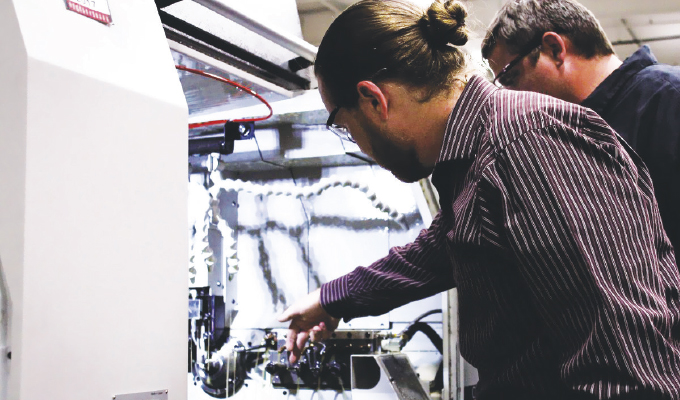By David Kaminski, QED Environmental Systems, Inc.
The site of a former U.S. Department of Energy (DOE) nuclear weapons production facility in Largo, Florida, also known as the Pinellas Plant, posed an extreme challenge for groundwater remediation pumps. Soil and surficial aquifers at the site, now known as the Young-Rainey Science, Technology, and Research Center, were contaminated by large quantities of light and dense non-aqueous phase liquids (NAPLs). Trichloroethene, dichloroethene, ethylene chloride, toluene, and heavy oils were discovered, with very high concentrations in groundwater and substantial amounts of free product in both floating and sinking layers.
COMBINED TECHNOLOGY SOLUTIONS
Because the site consisted of tight soils with a low hydraulic gradient, project engineers chose a combination of electric and steam-driven thermal techniques to enhance remediation. In this approach, the soil and aquifer are heated by electrical resistance to current from underground electrodes and by injection of superheated steam into the wells. High temperatures increase the mobility of viscous NAPLs; some components actually boil and can be removed as vapor. Dual phase extraction wells recover soil vapor by application of vacuum at the wellhead and liquid via down well pumps.
The first phase of the project employed a variety of pumps, including progressive cavity and sucker rod models. Significant operational and maintenance problems occurred, largely caused by ambient temperatures exceeding 212 degrees Fahrenheit (100 degrees Celsius), aggressive chlorinated solvents, and high chloride levels.

AUTOPUMP AIR-POWERED PUMPS
For the second remediation phase, consulting engineer Ed Tung of MK Environmental, Inc., a recognized authority on thermal remediation technology, specified AutoPump® air-powered pumps from QED. With a cast stainless steel internal control mechanism, high-clearance design, and rugged construction of specially-selected durable materials, these pumps thrive in harsh environments and are capable of pumping viscous, high-solids content liquids without clogging.
Twenty-three AutoPumps were installed at the Largo site, operating at flow rates between 2 and 5 gallons per minute (2,880-7,200 gallons per day). Still, even for such extreme pumps, conditions in the wells proved to be difficult.
SUPERIOR RELIABILITY AND REDUCED DOWNTIME
However, the tough pumps provided superior reliability, and simple field maintenance procedures quickly returned failed pumps to service, reducing downtime and maximizing project efficiency. Cleanup of the site proceeded on schedule, and subsequent sampling verified that the remediation was successful, with post-treatment contaminant concentrations reaching project goals.
FOR MORE INFORMATION
Siemens Digital Industries Software, a business unit of Siemens Digital Industries, is a leading global provider of software solutions to drive the digital transformation of industry, creating new opportunities for manufacturers to realize innovation. With headquarters in Plano, Texas, and over 140,000 customers worldwide, we work with companies of all sizes to transform the way ideas come to life, the way products are realized, and the way products and assets in operation are used and understood. For more information, visit www.sw.siemens.com.
David Kaminski is senior vice president at QED Environmental Systems, Inc. QED Environmental Systems is the leading manufacturer of innovative environmental products. For over thirty years their expertise has included pumping systems, landfill products, and air strippers. For more information, visit www.qedenv.com.
MODERN PUMPING TODAY, September 2019
Did you enjoy this article?
Subscribe to the FREE Digital Edition of Modern Pumping Today Magazine!



